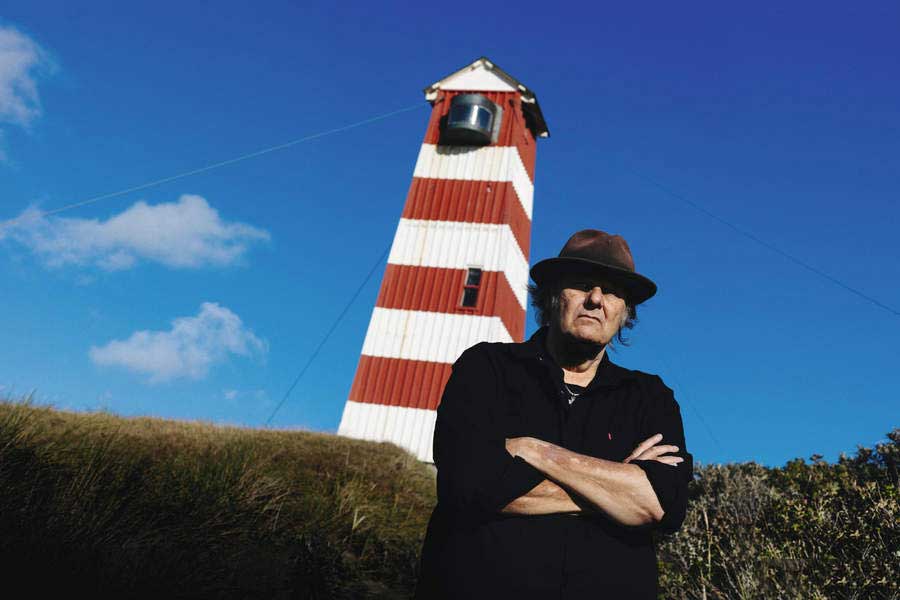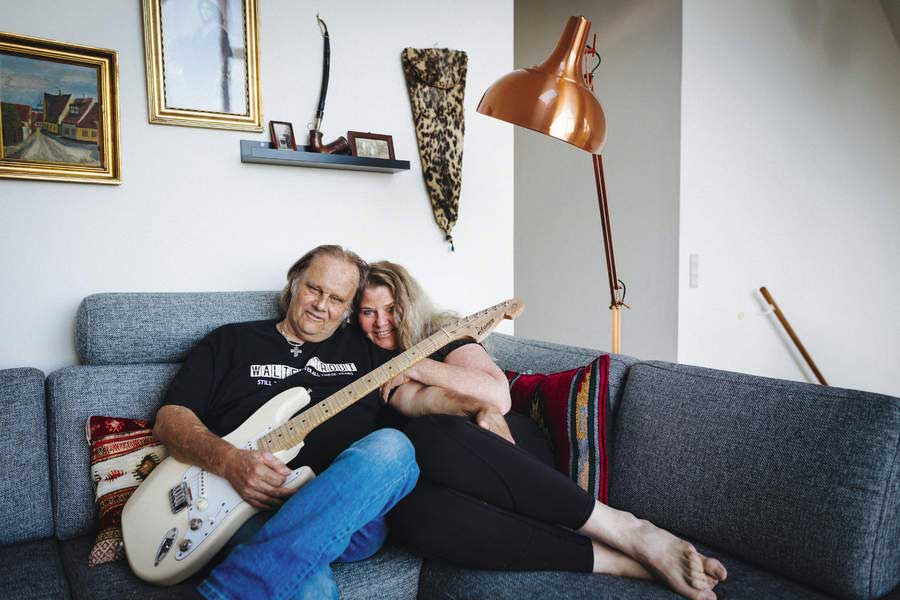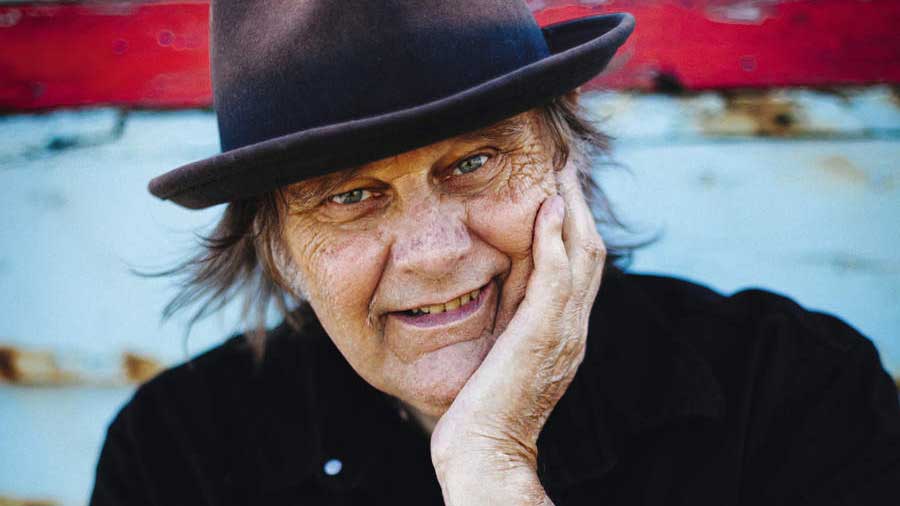The rugged stretch of northern Denmark, which Walter Trout calls home, is often referred to as ‘cold Hawaii’. It’s easy to see why. As we drive towards his house in the fishing village of Vorupør, the North Sea lurches to our right in towering, frothy waves – daring surfers to tackle them. On land, other natural scenes feel more Scandi: tall evergreens, small herds of cows, scrubby grass dunes dotted with World War II bunkers. We’re in the car with Trout and his Danish wife/manager, Marie, when a language lesson begins.
“It’s very soft,” Marie says of the Danish word for ‘thank you’, as she steers us past a striped lighthouse towards the beach. Thirty years in California with Walter have Americanised her accent, but Denmark is in her blood. “Tak, like that, tak.”
So far, her husband’s grasp of Danish is a little sketchy. As she confides later, that hasn’t helped his application for Danish residency.
“Takka-takka-takka tak!” he cackles in broad New Jersey tones, drumming his hands on the dashboard, grinning mischievously. Briefly the storied, 71-year-old bluesman is like a schoolboy, even with his dark eyes, hand tremors and mottled skin on his arms; signifiers of more than just age. Dark times. Wild times. The liver transplant that saved him eight years ago. Walter Trout has a more turbulent past than most, much of it tracing back to his violent (former prisoner-of-war) stepfather in Laurel Springs, New Jersey.
Today, pulling faces for our photographer among the fishing boats, he betrays none of this. He cracks jokes about his hair – thin and flailing in the strong winds – and pulls back his black shirt to reveal the slogan: ‘Still Too Loud After All These Years’. Locals in sensible outdoor gear look on curiously. There’s a healthy, hardy vibe to the area; the nearby roadside hotel we’ve checked into is filled with cyclists.
The Trouts have been coming here on holiday for years. Marie grew up in this part of the world, and her mother still lives close by. They moved here more permanently in 2020, spurred on by the lack of covid-conscientiousness around them in the US (an understandable concern for someone with Walter’s health history), although they’ve retained a place in Huntingdon Beach, CA. All three of their sons have dual citizenship.
“They have an American passport and a Danish passport,” Walter says, showing us around their stylish modern home – all architect-designed high ceilings, white walls and artistic furnishings, backing onto national parkland. “And now they have all ended up living in this country, and I don’t know if they’re going back.”
Music runs in the family, on both sides. On the wall hangs a sealskin violin case that belonged to Marie’s great-grandfather. Walter points out a trombone hanging by the window; another of her heirlooms.
The Trouts’ guitar-playing eldest, Jon, speaks Danish fluently. Middle child, born Michael, has come out as non-binary and now goes by the name Biscuit. “He, sorry, they,” Walter says, correcting himself quickly, “is a bartender in a really nice restaurant in Thisted, and they make this amazing music – it’s amazing.” Their youngest, Dylan (“another musical virtuoso,” Walter adds proudly. “He can play all this Eric Johnson stuff’), is training to be a chef in Copenhagen. When he comes home he and Marie cook together.
“He’ll make me my favourite, which is penne alla vodka,” Trout says. “But the vodka is burned off. I’ve been sober for thirty-five years. I just hit thirty-five years on July ninth.”
He glazes over for a moment, as if suddenly remembering this fact. “Thirty-five,” he repeats.

A happy but haunted man who gave himself to rock’n’roll at 14 (and hasn’t looked back), Walter Trout teeters on a knife-edge between joy and pain; gratitude for life, and the spectres of a deeply troubled childhood. During our conversations today he’ll hoot with laughter, and be emotionally vulnerable in a way that most men of his generation don’t dare.
But as we learn over the course of an afternoon – and as his latest music drives home – the essence of him lies in the space where those extremes bleed together. It’s all there in the wistful tones of his thirtieth solo album, Ride: the combinations of light and dark; upbeat tempos with minor keys (Ghosts); funky beats propelling dark tales (I Worry Too Much). It’s the sound of a person still processing a lot.
“I just received copies yesterday, and I was realising that ninety per cent of the songs are me dealing with crap from my past and trying to make sense of it,” he says. “I’m enjoying life and I’m grateful to be here, but I still can’t get…” He searches for the words. “Way down in there, there’s things about my youth and my past that haunt me, and that I ended up writing about. I can’t sit down and write some fluffy bullshit. If I’m going to sing something, I’ve got to live the words.”
Post-transplant life has involved some changes. He eats a vegetarian diet (fish is fine, meat gives him gout). He takes immunosuppressants. If he has pomegranate or grapefruit, he’ll “keel over dead”. Today, as we sip black coffee at the Trouts’ kitchen table, he drinks sparkling water. We share watermelon slices and a plate of cookies. Outside the wind howls into the grassy waves of the dunes.
For a man who drank half the architects of rock’n’roll under the table in the 70s and 80s, it’s been a serious turnaround. Arriving in Los Angeles in October 1974, in a VW Bug (he was sustained en route from New Jersey by peanut butter and jelly), Trout wound up lost, in a gorilla suit, on LSD, sobbing to a diner waitress. She gave him directions and he survived that first night. It led to prodigious guitarist stints with John Lee Hooker and Big Mama Thornton, among others. “I called her ‘Mama’,” he says, when asked. “I loved her.”
From there ensued adventures with Canned Heat and John Mayall’s Bluesbreakers. Days of ‘chateau hibiscus’ (a Mayall/Trout ritual that entailed mixing end-of-night dregs from punters’ drinks into one lethal brew) and the infamous Brain Damage Club at Mayall’s Laurel Canyon residence: “Basically you’d go and get shit-faced with John McVie and Mick Taylor and people like that, and to be inducted you had to show sufficient evidence of brain damage.” Mayall got sober soon after, but he and Trout remained friends, united by a relentless work ethic and an anti-purist love of the blues.
“I know I’m put in a blues category because of my pedigree,” Trout says, nursing his left hand – metal rods hold his pinkie in place, following multiple gig-induced fractures. “But when I’m writing I refuse to be stuck in any genre. That’s why the blues purists have always had a problem with me. And I don’t care.”

Ultimately, though, it all points back to his youth, which lives on in Ride. Opener Ghosts reflects on music’s time-travel powers. It takes him back to 1964, he tells us, listening to The Beatles, while his stepfather chopped down the bedroom door with an axe.
But there were happy times too. Bittersweet times. Waking up at 3am as passing trains shook the house, which is captured in the Allmans-esque keyboards and warm swing of the title track: ‘I would dream about the day when I could jump aboard and ride.’
“I grew to love it,” he says, smiling, “the sound of the train, the whistle, the whole thing. I would think to myself: ‘All I gotta do is get out of the bed, put my clothes on, cross the street, jump on that freight train and get the fuck out of here.’ Right? I never did it. But I dreamt it all the time.”
On stage, Trout has long been a smiling, positive presence, exuding the lust for life of a man who expected to be dead by now. A man who’s happiest with a guitar in his hand, and looks for the good in people. In conversation, his past rises closer to the surface.
“I’ve gone through a lot of therapy and I’m happy,” he says. “I don’t sit around and freak out or anything, but I still am influenced and it’s still there pretty deeply, you know?”
The song Collingswood, from 2003 album Relentless, is still perhaps his rawest confessional moment. It’s named after the neighbourhood his mother took them to to escape his stepfather’s blows. He starts to recite the last verse: ‘It was so long ago, but it still affects me/Sometimes I wake up in a sweat. I lay there remembering a small boy as scared and lost as I could get/Out of the darkness comes a vision. I wonder what it is I see/Then I realise it’s the spirit of my mama. And she wraps her arms around me, and says: “It’s alright. It’s alright.” Someday it’ll be alright.’
His voice breaks. The house grows very still.
“I’m still waiting,” he says. He sobs quietly.

An hour or so later we return from a drive. Back at the kitchen table, Walter entertains with lively impressions of old Texan bluesman Clarence ‘Gatemouth’ Brown – another touring buddy of yore.
“That’s gon’ be five dollars!” he replies when our photographer asks him to sign his copy of Ride. “Ha! Fyyye dollah, as we would say in Jersey.”
That levity crops up on Ride highlight I Worry Too Much. Originally a much darker, “bordering on psychotic” track, it finds Walter cheerfully bellowing: ‘I worry about the future, worry about the past/Worry about my liver, how long it’s gonna last’ to a buoyant 12-bar groove. This kind of bleak humour hasn’t sat well with everyone. Some fellow transplantees, he tells us, have reprimanded him on social media.
“I gotta laugh at stuff,” he reasons, “I was in bed for eight months, I had brain damage, I couldn’t speak, I weighed a hundred pounds, I didn’t have a bite of solid food for six months. We all deal with it in our own way. And the only way I am able to deal with it is to try to find some sort of humour in the whole thing.”
Grey areas like this have peppered his records ever since. On 2020’s Ordinary Madness, Wanna Dance throws the listener with a surprisingly haunting, emotive tune – inspired by a 30-style swing-dance club in Long Beach that he and Marie visited around 2015-18, escaping the stresses of work and parenthood. It’s the stuff of very human highs, lows and uncertainties.
“That is the ground that I exist on,” he says. “Bleeding them together. Is it heartbreak? Is it joy? Is it regret? Is it gratefulness? Is it diving into life? Or is it escaping?”

One of rock’s successful marriages, Walter and Marie met in 1990 at a gig in Denmark. She was 27 at the time, and had her own advertising firm. Their eyes met across the room. He waved and fell over a mic stand. Within an hour of meeting, post-show, he’d declared that they would move to the US, marry and have children. She told him he was crazy. A week later she agreed.
That no-bullshit mind-set, coupled with a reckless streak, has anchored their married couple/artist-manager relationship ever since. It enabled Marie to reveal the “tens of thousands of dollars” Walter was swindled out of by previous business associates. More pivotally, it was Marie who in 2014 put him on the plane to Omaha for the transplant that saved him.
“And sometimes, you know, we disagree about things,” she adds. “It’s not about right or wrong. It’s about going around the dialogue about the issue. So we have these very in-depth discussions. We really get in there. We’re not afraid of each other, I think that’s the bottom line. It doesn’t have to be pretty. We just keep going.”
There have been testing times. On Ride, the ballad Follow You Back Home is about a rocky patch in their marriage.
“I don’t want to go too into detail,” he says, “but we had some problems and we separated for a while. I lived in a hotel for a while, right down the street. There was my house with my kids and my wife, and I was alone in this hotel room, figuring out what I want out of life. And so when I wrote this, I thought ‘I’m going to put myself back in that hotel room. My wife and kids are a mile away. How did that feel?’”
At home their schedules are different. Marie gets up at six to go for a bike ride or a jog, and to work across multiple time zones. Walter likes to sleep later: “I’m pretty much always on rock’n’roll time.”
“He gets his exercise on stage,” Marie adds, almost protectively. “If you’ve seen him perform, that’s a good workout. Now…” she raises her eyebrows. “Two years off, no stage, and that floating-through-the-house thing is not really doing it. So we were kind of joking that I was walking him. Like: ‘I gotta walk the husband now!’”
“Put a leash on me, drag me through the forest!” he titters. “But it became great. I got a whole new appreciation for nature. I don’t see much nature on tour.”
When restrictions began to lift, and gig offers did start rolling in, he told Marie to say yes to everything. When we meet, he’s just completed a huge spring/summer tour. The autumn schedule they’ve assembled covers a sprawl of countries and transatlantic trips. Two of his bandmates have already ruled out committing to the full run.
“It’s ridiculous,” he admits. “But I’m going to try. My bass player literally passed out in the airport the other day,” he says, laughing. “And he’s in good shape! He hikes in the mountains and does yoga, he’s a vegan!”
Walter knows his workload is not sustainable. That he’ll need to scale back next year. And yet you can’t help feeling that, were it not for health constraints, he would do it all again in a heartbeat. For Trout the stage is about much more than paying the bills. It’s where he ran to after his transplant, losing himself in the Royal Albert Hall. Perhaps the closest he gets to peace.
“Suddenly I was in complete control of myself,” he remembers. “I had that whole room, right in the palm of my hand. And I was like: ‘Fuck yeah, this is what I do. It’s what I’ve done since I was a kid.’ You know, it feels like home. Not always, but most of the time.”
We leave Walter and Marie waving from their back door, the evening sun just beginning to dip as the Cold Hawaii surf whips up on the horizon. There are tour logistics to finagle, the release of Ride to anticipate. For now, though, they’re looking forward to their kids’ next visits, thinking about dinner and maybe a walk along the beach.
“It’s never the same two days in a row,” she says, watching the light on the sand, the fishing boats, the rays cast over her husband. “It’s never the same."
Ride is out now via Mascot/Provogue.

